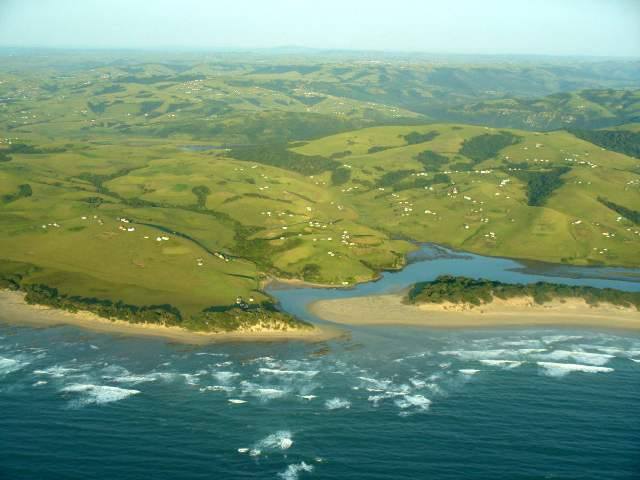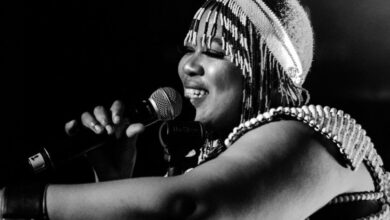Bulungula Lodge and Incubator – ‘A catalyst for vibrant and sustainable rural communities’

Go to spend two days (or more) in the Bulungula Lodge in South Africa, and you will be amazed by the breathtaking environment, the hospitality of the rural Xhosa community and the great atmosphere with other independent travelers. This eco-lodge launched in 2004 is an example of how tourism can have a positive impact on rural villages in Africa. The Lonely Planet said recently that is was the second best eco-lodge in the world! In 2007, an incubator was created to develop innovative responses to challenges faced by the community in five areas: basic services, sustainable livelihoods, education, health and nutrition. It represents today more than 200 people that are working directly or indirectly for Bulungula Lodge and Incubator. Interview with Dave Martin, who is at the origin of this surprising project.

Dave Martin, founder of Bulungula Lodge and Incubator – Credits Gordon McAllister
SparkTour Africa: Why Bulungula Lodge was created in 2004?
Dave Martin, founder of Bulungula Lodge and Incubator: I enjoyed the community development field when was at university, and then I spent two years traveling around Africa and the rest of the word. Bulungula was the fusion of these two passions that are travel and community development. I wanted to use tourism as a tool for community development in remote areas of South Africa. The name ‘Bulungula’ comes from the name of the river here!
‘Bulungula was the fusion of these two passions that are travel and community development.’
Bulungula is an ‘eco-lodge’, can you explain why?
Bulungula is located in a very remote area, so there are no services from government or outside agencies. We have to be totally sustainable because there is no water or electricity coming from somewhere. We have to make sure that we are not damaging the piece of land that we are in, because this is the only space that we got! Everything we do is designed to have no negative impact on our surroundings. Concerning energy for example, we have a very small energy consumption, we use very efficient electronic devices and we generate our energy through solar. Furthermore, we use compost-toilets, we collect rain water for the laundry, our stoves and fridge work with natural gas…
‘Everything we do is designed to have no negative impact on our surroundings.’
At the beginning, was it hard to attract backpackers here?
It was difficult, because in those days there was not even a dirt road! In the same time, it is an unusually beautiful place, and people from the community are very welcoming. In a way, being very remote create a kind of mystical paradise that you struggle to get to. By definition, paradise is always difficult to get to!
How many backpackers are coming to the lodge every month?
The average occupancy is around 20 people per night, and as each of them stay 3 or 4 nights, it makes in total around 150 to 200 people per month.

A breath-taking environment
In 2007, you launched with the local community the ‘Bulungula Incubator’, working in five different areas: basic services, sustainable livelihoods, education, health and nutrition. What do you do exactly?
When we started the lodge, we saw that it was a very poor and remote area. For example, more than half of the women have lost at least one child. Without access to clean water, toilets, clinics, or schools, there are a lot of challenges in terms of development. The lodge helps obviously with creating employment, but we wanted to do something more significant. The NGO ‘Bulungula Incubator’ was created to work with the community to solve these challenges.
‘We wanted to do something more significant.’
What are the results of this initiative?
In 2006, we lost almost 1/3 of the babies of our village because of diarrhea. Now that we have launched the incubator, no more babies die. We created four pre-schools with a high level, and we made a lot of projects around clean water, health in pregnancy or education about nutrition. We don’t focus on one particular problem, but we look at the holistic challenge that faces people in this area. In the same time, we don’t want to change their culture and their lifestyle.

Inside one of the pre-schools created by Bulungula Incubator
So, today, 250 people from the community are working directly or indirectly for Bulungula Lodge and Incubator?
The lodge itself employs 22 people directly, and then there are 25 people who have their own small businesses running on the lodge. We wanted people to learn about how to run their own micro-enterprise, so guests have now the possibility to do canoeing, horse-riding, to learn about the traditional medicine, to discover the village, to spend a day as a local woman… Those tours are all 100% own and run by the community. We want to show them that working is not only to come on time, but it is also being innovative and creative about your business, so that more people will come and do it.
‘We want to show them that working is not only to come on time, but it is also being innovative and creative about your business, so that more people will come and do it.’
In the incubator, we have got two employees who are running the whole range of projects. There is also a government programme, the ‘Community Workers Programme’ which employs 200 people. Their job is to help with issues identified in the community that require mostly labor work to solve: improving the water, fixing the pre-schools and other things like that.

Lindo, who runs the canoeing micro-enterprise
Can you give three words to describe the spirit of Bulungula?
Community, innovation, and environment.
What was the biggest challenge since 2004?
There was so many! The challenges change as the project is growing. At the beginning, it was to manage logistics with a very little money in this remote area. That was also a challenge to make people coming every day, and to make them have a good time. Now, the challenges are more in the development side: helping the community to take better decisions about their future.
‘Now, the challenges are more in the development side: helping the community to take better decisions about their future.’
Is eco-tourism well developed in South Africa?
Eco-tourism is a very broad concept that means different things to different people. There are a lot of places referring themselves as ‘eco-tourism’, which are doing different levels of environmental intervention. Practically and philosophically, we are more involved than most of them, also because we don’t have another choice. There is a lot of green washing in this sector, but there are also some great places doing amazing work. I invite people to ask harder questions about how the place where they stay makes things happen.
‘Eco-tourism is a very broad concept that means different things to different people.’
Today, a lot of young South Africans want to embark on an entrepreneurial adventure to improve society. Do you have an advice for them?
The first thing to do is to get experience in the sector where you want to work. It is easy to idealize a particular sector, tourism for example. There is a big difference between a patient and a dentist. So, spend six months in this field to understand what it means to work there.
Once you have that experience, be brave, be idealistic, do the numbers as you can’t get away from the mathematics, don’t give up, ask people who have done it before and take the advice without being discouraged if they are negative.
A last word?
The community will take over full ownership at the lodge at the end of this year, which is a new era and maybe the first time that something like that is happening in Africa and in the world. I invite everyone to come and see how a lodge own and run by a community cut-off from outside world for many years works. Come and enjoy it!
‘The community will take over full ownership at the lodge at the end of this year, which is a new era and maybe the first time that something like that is happening in Africa and in the world.’




